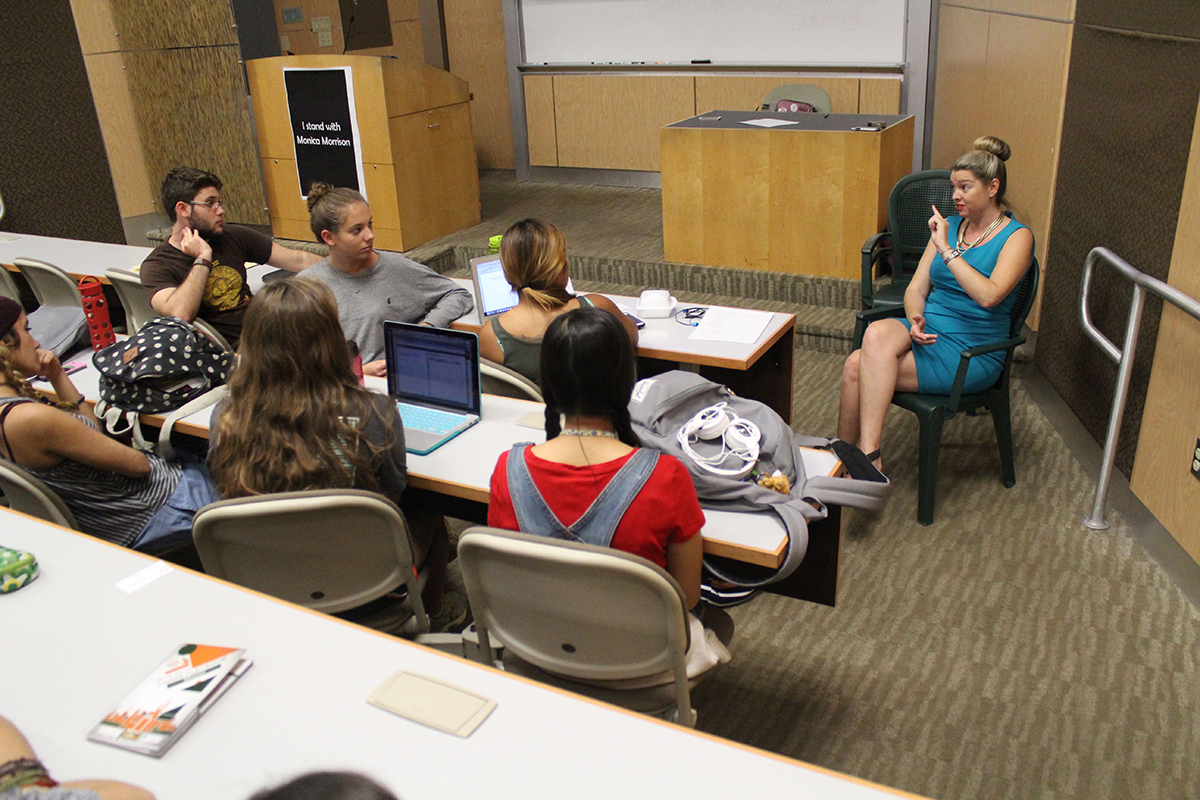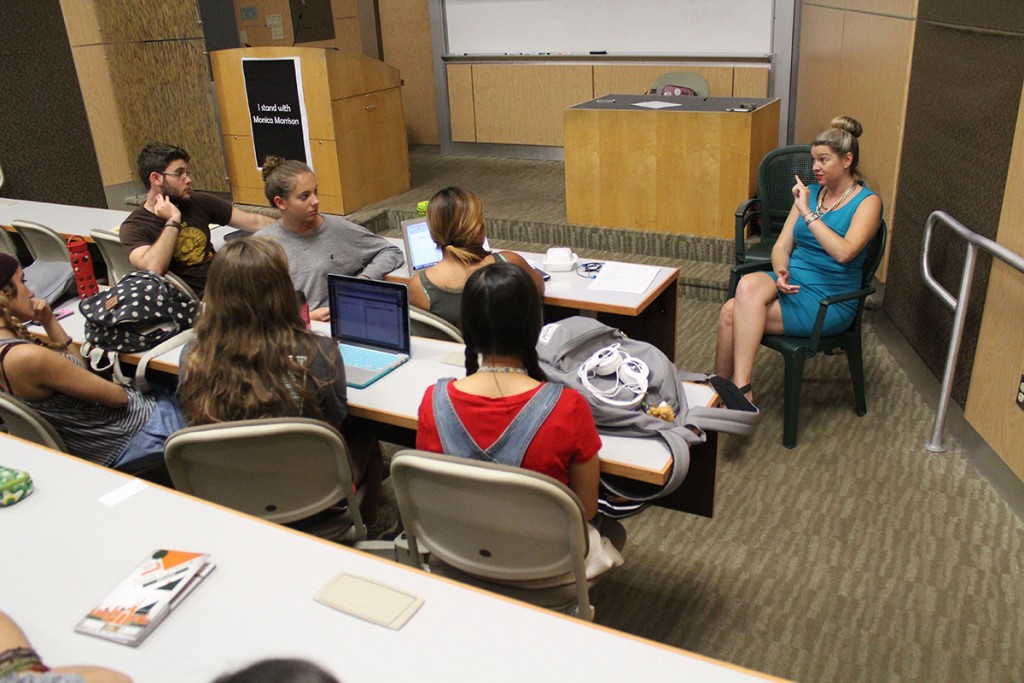

A former graduate student at the University of Miami is suing the university for allegedly violating her Title IX rights when handling sexual harassment allegations she brought against a professor in September 2012. Monica Morrison’s lawyer filed the lawsuit in Miami-Dade county on Oct. 15 and is also suing two former university employees, philosophy professors Colin McGinn and Edward Erwin.
The lawsuit contains 13 counts brought against the three defendants, respectively, and includes civil assault, breach of fiduciary duty, retaliation and sexual harassment charges. McGinn’s attorney, Andrew Berman, said in a Huffington Post article from Oct. 16 that the professor “denies the claims and we will vigorously defend against them in the appropriate forum.” The article also said Erwin “declined to comment, citing advice from his lawyer.”
The lawsuit claims that Morrison’s sexual harassment allegations were first brought to the university’s attention in 2012, when she was a Ph.D. student in the Department of Philosophy. Morrison began her studies at UM in the fall of 2011 and took a class taught by renowned philosopher McGinn in her first semester.
As the semester came to a close in December, the lawsuit claims McGinn asked Morrison to be his research assistant for the spring semester and she accepted. The lawsuit states that the two met frequently throughout the semester, in addition to their required meetings every Tuesday and Thursday, and formed a working relationship in which they sent email and text messages to each other.
According to Morrison’s account and message records in the lawsuit, McGinn’s messages became increasingly sexual in nature; he made reference to his sexual arousal, Morrison’s body and the novel “Lolita” by Vladimir Nabokov, in which a teacher has a sexual relationship with his student, who is a child.
Correspondence between the two – vacillating in its sexual nature – continued throughout the semester and into the summer, according to the lawsuit; then Morrison returned to campus, she resigned as McGinn’s RA and filed what she believed to be a formal sexual harassment complaint against McGinn.
The lawsuit says that she requested the university block McGinn from being able to contact her remove McGinn from committees that would be judging her academic progress and protect her from his retaliation. The lawsuit says that the Office of Equality Administration filed an informal complaint and after a university investigation, the university found there to be insufficient evidence to support her claims.
According to the lawsuit, much to Morrison’s dismay, the university submitted a charge to the Faculty Senate: “failure to report a consensual relationship with a student.” McGinn was urged by the university to resign and he was officially unemployed by the university on Dec. 31, 2013, 10 months after his resignation agreement was signed and more than a year after a formal charge was submitted to the Faculty Senate.
Morrison decided to leave the university in April 2013, dissatisfied with how UM handled the case and concerned about her future in the field of philosophy, in favor of a fellowship at Indiana University.
The lawsuit alleges that McGinn and fellow professor Erwin retaliated against Morrison during the time she was still at the university, sending emails about the allegations to professors at prestigious universities and graduate students and professors within UM.
The lawsuit claims that at the time, the university not only stood by its decisions and thorough investigation of the allegations, but also boasted its swift response. McGinn’s tenured status in the university would have made firing him extremely challenging (an “uphill battle”), according to Eric Isicoff, the attorney UM has assigned to lead the defense in the case. Isicoff, of the law firm Isicoff, Ragatz and Koenigsberg, said the university took a more “aggressive and efficient” action by asking McGinn to resign.
“The university is not a perfect entity, [but]…not only did it do things right, but it went above and beyond the call of duty,” he said.
Despite the university’s self-confidence in its actions, many disagreed with the proceedings and outcome of the case, and the story of a famed professor and his pupil caught fire in the media. The Chronicle of Higher Education first published an article on the case when it obtained copies of correspondence between McGinn and Morrison.
Publications went with differing narratives – the New York Times took the opportunity to highlight gender inequality in the field of philosophy, Slate painted a picture of a complex, multilayered bond-gone-wrong between a philosophic leader and his student – each pulling text to bolster its claims from the more than 400 pages of messages between McGinn and Morrison.
After the initial storm of media attention, Isicoff said the university thought the controversy had blown over and Morrison had “moved on.” Meanwhile, Morrison sought out lawyer Ann Olivarius, who was involved in litigating the Alexander v. Yale case, the first case to use Title IX in charges of sexual harassment within a university.
According to Olivarius, Morrison decided to pursue a suit because her name had already been sent to a number of professors and students, so making the allegations and seeking justice publicly could not do more harm.
“Due to McGinn’s and Erwin’s blogging and earlier press attention, we figured that her name would circulate anyway after filing suit, so she decided that she could do more good by going public than staying anonymous,” Olivarius said.
Alongside their letters to professors and students about the allegations, McGinn and Erwin posted on McGinn’s blog. McGinn himself regularly posted cryptic messages or expressions of his dissatisfaction with the outcome of the case.
On April 15, 2015, he posted, “I certainly thought it would be better to leave UM in the circumstances and find somewhere else to work. I was disgusted by the way I had been treated.”
Despite these direct references to the allegations, including some posts containing what the lawsuit labeled as references to Morrison, Isicoff said there was no substantial evidence of retaliation on McGinn’s part for the university to lodge a claim against him.
“If you look at the actual, written materials, I don’t think you could make a case,” he said. “But to the extent either was engaged, they would’ve been doing so on their own.”
Isicoff is not a lawyer for McGinn, but defends the university’s actions and upholds that there was no Title IX violation.
Katharine Westaway, the women’s and gender studies professor most recently known for speaking out against the university’s handling of student Angela Cameron’s sexual assault case in the Spring, held a press conference on Tuesday afternoon to discuss Morrison’s case.
Shifa Akhtar, a senior neuroscience major and president of the National Organization for Women at UM, stood at a podium with a poster that read “We stand with Monica Morrison” in the Whitten Learning Center to deliver a message of frustration.
“A professor is someone who should be someone that a student could go to and trust and look towards for helping achieving their academic goals and their career goals,” she said. “With the levels of high academic achievement at the University of Miami, there’s no room for cases like this to occur.”
Akhtar said the university’s sheer standing in the community and wealth of resources give it the power to become a local, national and global leader in the fight against sexual violence on campus.
Since 2013, when Morrsion and McGinn left the university, administrators have attempted to make strides against sexual violence in the form of educational tools and coalitions.
Former president Donna Shalala created the President’s Campus Coalition on Sexual Violence Prevention and Education in May 2014. In the spring, a campus-wide survey was conducted to record the prevalence of sexual violence at UM. The results of the survey are expected to be released before spring of 2016.
To see the full lawsuit, click here.





